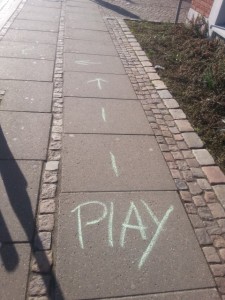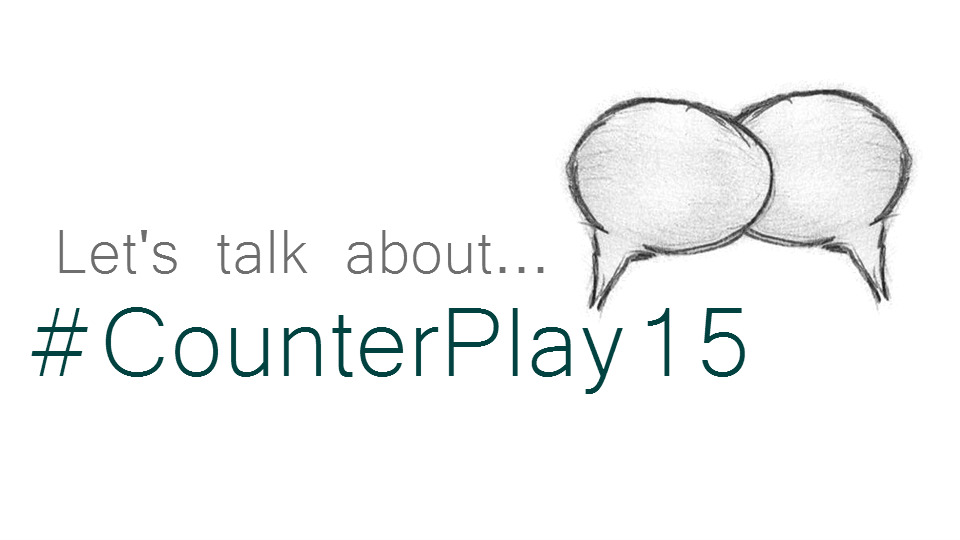 Ever since the first CounterPlay festival back in April, I’ve been working on CounterPlay ’15.
Ever since the first CounterPlay festival back in April, I’ve been working on CounterPlay ’15.
The first time was an absolute blast, and it seems like the 150 playful participants generally share that sentiment. There’s lots of room for improvement and new ideas, of course, but I’m incredibly happy with the outcome.
Hey, it was just a weird dream of mine, but apparently it somehow resonated with people (read this for more reflections on the festival and see all the reactions & presentations here).
So what now?
Now I wish for CounterPlay to become much better, more diverse, and more rooted in the local community, while establishing a much wider reach into the world.
I have a fairly clear idea about the purpose of CounterPlay, but I do get this question a lot:
What is CounterPlay?
…which means I haven’t been communicating clearly enough.
Well, the core of the endeavour is cultivating playful communities and inspiring more play in the world.
When I want more play in edu & society, it's not primarily to achieve some external goal; it's to achieve more play & playful lives.
— Mathias Poulsen (@mathiaspoulsen) October 9, 2013
Let’s start with the name – CounterPlay. It’s inspired by a (somewhat cursory, I’ll readily admit) reading of an issue of The Fibreculture Journal titled “Counterplay“:
Referring to ludic or playful vitality in its most transformative expressions, counterplay speaks directly to the disruptive creation of the new through the reiterations of gaming.
To me, this means (among other things) to challenge our perceptions of what it means to play, who can play & where it makes sense to play (hint: play is for everybody, everywhere, and I assume that play generally is a very healthy component in our lives).
https://twitter.com/LindaKolling/statuses/451650197517778944
Who do I consider the target group for this?
The primary audience is professionals across domains, who either work with or could benefit from working with games & play. I initially used the tracks “playful culture”, “playful learning” & “playful business” to indicate the intention to bring people together from many different domains. Taken together, these cover a very wide area.
It’s about creating a community, where people meet to learn & play together; People in education, researchers, pedagogues, game developers & “play makers”, librarians, journalists & culture curators, people in HR, communication & corporate training…and so on.
By including those & many more in the conversations, I’m convinced we’ll all become smarter.
Read a bit more about the tracks here:
[learn_more caption=”Playful Learning”] Play (whether it relates to games or not) is very much about learning. Learning the rules of the game. Learning to master the game. Learning to interact with other people in meaningful ways – and so on. The idea that games should be a greater part of education is catching on, but what does that really mean? What are the potentials of these approaches? Is it possible to actually play games in school, or does it become simple instrumentalization? Is play opposed to the very structure of education or can we maybe even embrace play?
[su_button url=”http://www.counterplay.org/playful-learning/”]Read more[/su_button][/learn_more][learn_more caption=”Playful Culture”] Playing and playing games is part of and continues to greatly contribute to human culture in various ways. How is that? How can we understand games alongside other media? What is a “playful culture”? How can e.g. librarians and journalists approach games critically and respectfully? How do we, as a society, improve our understanding and conversations about both games and play?[/learn_more][learn_more caption=”Playful Organisations”] With the surge of “gamification”, an increasing number of public and private organisations seem increasingly interested in the potential of games to communicate, to increase motivation, to train etc. This is and interesting tendency, but it all too frequently leads to an oversimplified perception about what games are. Furthermore, there might be many, many other ways in which games and, not least, being playful can create value in organisations – ways that may or may not be covered by gamification. How can organisations become more playful – and why should they? Can the act of play challenge and develop organisational cultures and identities? What are the uses of actual games in organisations?
[su_button url=”http://www.counterplay.org/playful-business/”]Read more[/su_button][/learn_more]
But hey, some would say;
“There’s already a lot of amazing play/games festivals around the world, also in Europe”.
This is true, and the increasing growth & diversity of the games/play festival scene is a wonderful thing. However, these events are often targeted primarily at (or attracting) people who are making games (& directly related professions).
I think the conversations & exploration of games & play simultaneously deserve and need a much broader audience than this. Judging from the overwhelming interest in the first festival, I’m not alone here. Most people apparently don’t go to “ordinary” games or play festivals, but this doesn’t mean they’re not interested in the field.
CounterPlay is aiming to bridge this gap, creating more diverse and dynamic conversations in a wider circle.
While “professionals” make up the primary target audience, it’s also my ambition to make (part of) the festival open & inclusive to anybody interested – be it children, youngsters, adults, families.
Come and play.
That also means creating a completely open & playful space, that stretches far beyond any physical venue, into the urban spaces, parks, museums…(more on this here) and definitely also far beyond the local community.
Oh, and the lack of clarity might also stem from a somewhat intentional obscurity and room for the unforeseen, as I want CounterPlay to be much more than what I myself can imagine. As such, CounterPlay is supposed to be a festival, that is as much shaped by the ideas, wishes and needs of the broad groups of participants as it is by the organizers.
What can you do?
There’s lots of things you can do: Give a talk. Host a workshop. Showcase playful things. Suggest new formats, activities, speakers. Become a sponsor . Submit an idea, any idea. Spread the word.
Whichever way you’d like to be part of CounterPlay, let’s talk. There’s no strings attached, and you can be as much or little involved as you wish.
The fastest way to get in touch would be Twitter (as it happens, most of CounterPlay ’14 was organized on Twitter). If you want to say a bit more, send me an email or join our group on Facebook.
Either way, I’d love to hear from you. All of you.

Leave a Reply